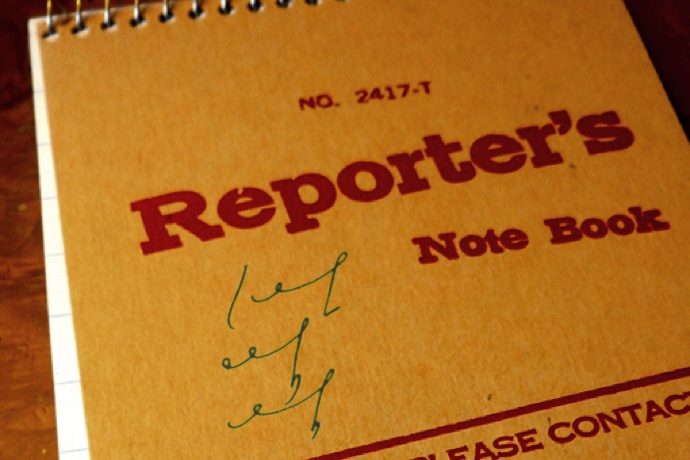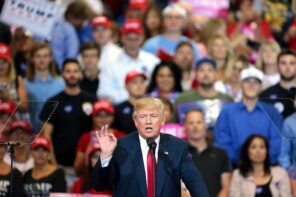The presidential race took a turn to religion recently. It was an opportunity to clearly and definitively locate the two presumptive candidates on the map of American religion, and it mostly failed. And it was mostly the fault of the press corps. The boys and girls on the bus are well-versed in the talking points, image strategies, the horse race—all the conventions of modern presidential campaign journalism.
Somewhere in each reporter’s notebook is a tab marked “religion.” The problem is that, unlike most of the other topics they’ll be reporting on, their understanding of religion is a mixture of broad bromides about the nature of religion in American life, mixed perhaps with entirely subjective notions of religion born of their own personal experience with it.
Among journalistic “broad truths:” religion used to be important to Americans, but isn’t anymore, except in rural areas and the Midwest and for those pesky evangelicals and mass-attending Catholics and of course the great and noble tradition of African-American Protestantism. What do you do about a candidate’s religion? She or he must have one, of course, but it doesn’t matter what it is—except when it does. And when it does it is about Abortion, scandals, or Nuns opposing Obamacare, or the purposely obscure rhetoric of “religious liberty.” Otherwise, religion is an entirely personal matter.
At least that is as far as conventional journalism can push it because, at the end of the day, you can’t “source” a religion story (at least that is the tacit myth among reporters). The best you can do is the hackneyed practice of “presenting both sides” and not bothering to evaluate or push either.
Time and again, observers, scholars, and practitioners of religion have pointed out how journalism has a lot of work to do to provide the same sort of substantive framing that is seasoned into its coverage of defense, business, women’s issues, race, etc. There are of course a few notable exceptions, but they are the exceptions. And few of them are “boys on the bus.”
This showed recently when Donald Trump made a visit to a politics forum in Washington sponsored by the evangelical organization United in Purpose. Trump’s widely-quoted declaration: “…we really don’t know anything about Hillary in terms of religion….” A variety of media voices noted that we do, in fact, know quite a bit about Hilary and religion. (Here’s an example from Politifact.)
So what did Trump mean, exactly? The mood in the room indicated he was not alone in his skepticism about her faith, and it is probably the case that most Americans don’t know too much about the subject. Its not that Clinton has been shy about the subject (other presidents—notably Reagan—have been remarkably reticent). She’s a lifelong Methodist, and has attended Washington’s Foundry United Methodist Church for years. Her biography is an impressively complete account of how church and faith shaped her values.
So why is it that we don’t know this? It is because Hillary is a liberal Protestant of the former Protestant Establishment. To journalists, she is a generic Christian and generic believer. That kind of faith is tacit and taken-for-granted in the culture. The religions that stand out are the ones that are active at contesting presumed established power and authority. The old aphorism still holds: dog bites man is not news, man bites dog is news. Protestants or Catholics who pray, talk and think about their faith, and do good things as a result are not news. That is what we expect. Contestations over religious liberty, over abortion, over the right to discriminate: those are news and those constitute the religion beat, at least to the politics reporter.
What Trump meant was that in the real day-to-day discourse of politics, the second-and-third-hand rehashed retail accounts on cable news that he pays attention to and that form the common political conversation of the moment, Hillary’s religion hasn’t been present. He was right about that. He was speaking to a context where religion does count to that common conversation—he was talking to a group of politically-involved evangelicals.
And, he was trying to undo his own version of Hillary’s problem. He’s a Presbyterian, you see, and not a particularly devout one, apparently (he referred the communion bread as “my little wafer” at one point, which sounds much more like something he overheard a Catholic say). His gaffes at places like Liberty University got a lot of play back when there were real evangelicals in the race against him.
Now, though, a lot of evangelicals feel, amazingly, that they must make peace with Trump. And to do so, they are falling back on some time-honored methods. If someone fails to meet your moral standards? You can point out that we are “all sinners” (as Hollis Phelps points out here on RD). Someone who formerly represented much that you are against? He would make a particularly powerful target for conversion. Conversion narratives are full of such accounts.
In Trump’s case, this case was made by the redoubtable voice in evangelical moral politics, Dr. James Dobson.
According to Dobson, Trump is now “a baby Christian” having been led to faith through prayer. “I don’t know when it was, but it has not been long,” Dr. Dobson said. “I believe he really made a commitment….” This sounds a bit vague, and should, to the average ear, but again the stakes are huge. If Trump can be counted as an insider to the evangelical community, a lot of the unease there will fade. Claiming that he’s on a path to righteousness gives important cover.
This is where competent journalism should come in. How to unpack this claim about Trump, or even the one about Clinton? It is not necessary to get into the weeds of religion to have a conversation on the superficial level of the political common conversation. An enterprising reporter knowledgeable about religion could put a question to each of the candidates. To Hillary, as a mainline Protestant, something like, “Secretary Clinton, could you give us a faith statement?” That would be about the right level of articulation for her community of shared belief.
For Trump, the issue is even more profound because of his contested history with conservative religion and evangelical culture has a tried and true public method of accounting for faith. The question today, post-Dobson, would be, “Mr. Trump, can you give us your testimony?” Evangelicals would understand implicitly what this is about, and if Mr. Trump is, actually, a “baby Christian” moving toward born-again status, he’d know exactly how to answer it.
There are a lot of reasons, of course, why this won’t happen.
It doesn’t exactly fit the grander narrative of religion in this campaign, where the fact of Trump’s pivot to the evangelical community is probably enough to cover what most reporters think is the main issue. They’d see both questions as too granular.
But it should be obvious that, in the case of Trump in particular, this would be important knowledge—as long as we still think an informed electorate matters.





